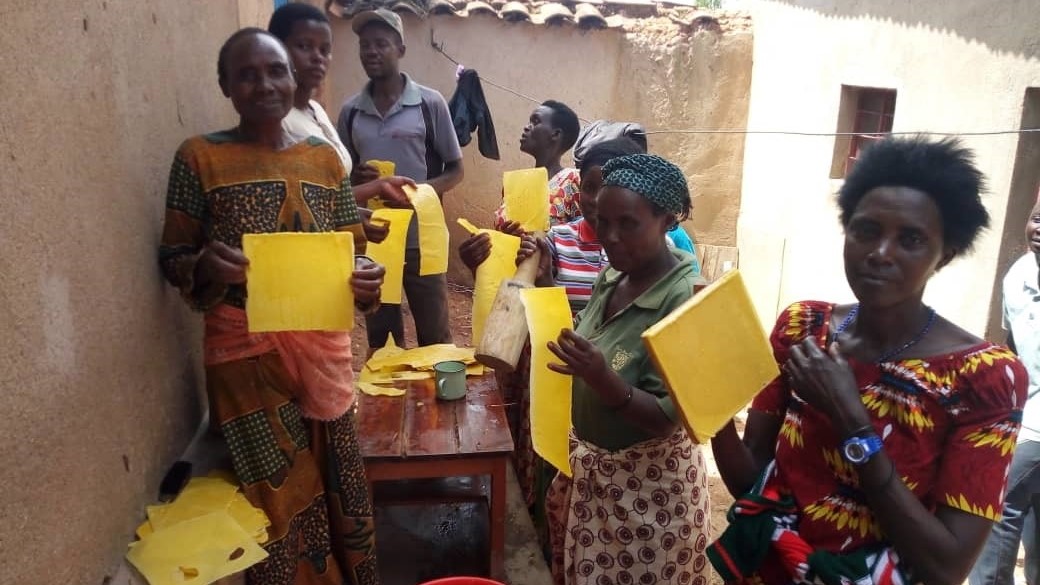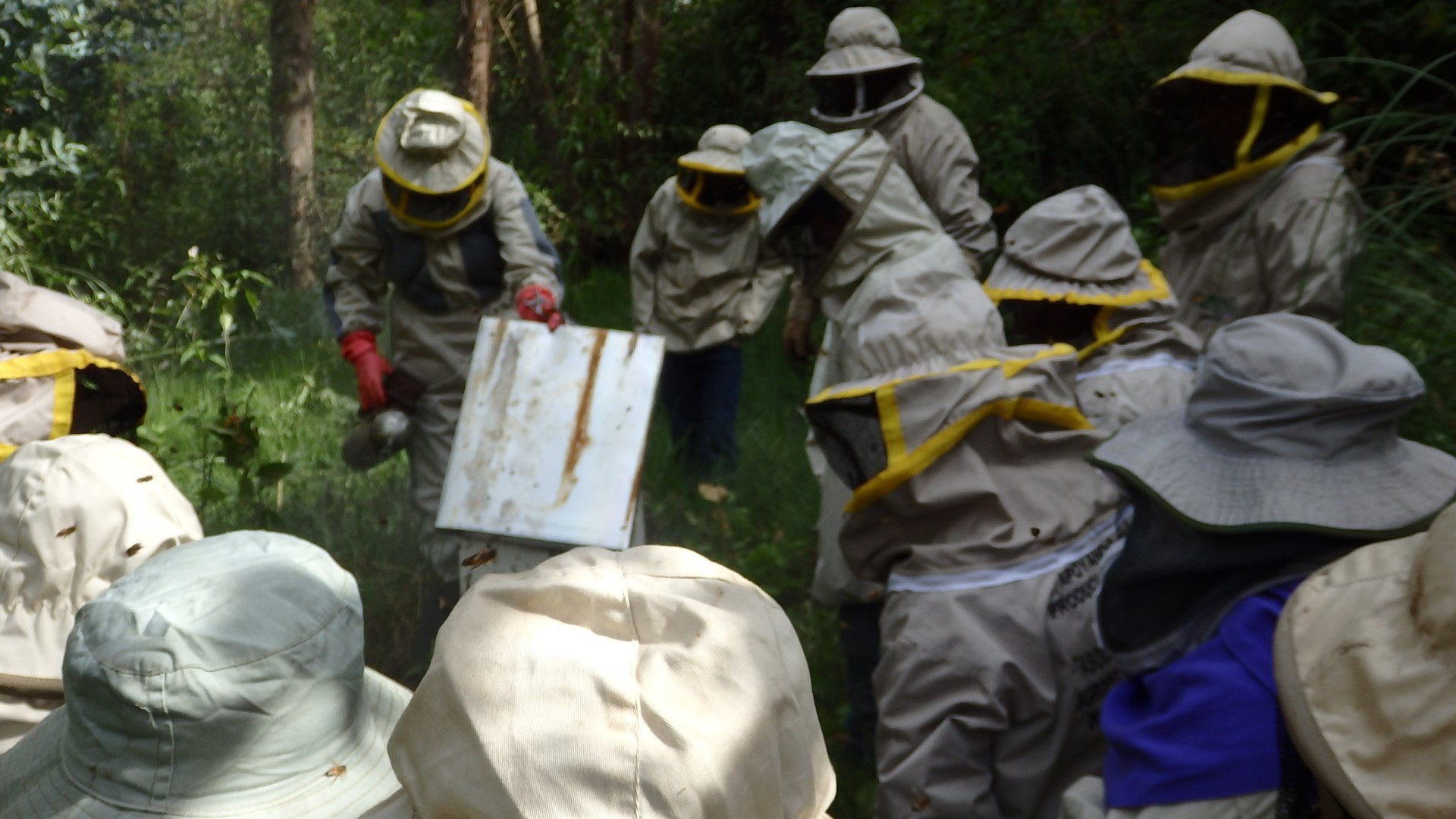Minds have evolved in 20 years. The beekeeping industry has changed and most Belgian beekeepers are now open to sharing good practices.
Benoît Olivier Tweet
For the Fair Trade Week, the NGO Miel Maya Honing (Maya Honey) launched a gift box celebrating global honey culture. It offers a unique opportunity to sample authentic products and to learn more about their origin and history. Our history…
A terraced house, like so many others, in Rue Sainte Walburge in Liège. But did you notice the poster of bees and honey behind the window? This must be where Miel Maya Honing resides. This development NGO is known for the support it has provided since 1975 to beekeepers from the South in marketing their quality products and making a decent living from their labour. Let us find out more about this creative beehive.
In the South as in the North
Miel Maya Honing has development projects in the South in Bolivia, Cameroon, Rwanda and the Democratic Republic of the Congo. The NGO assists small producers to become viable and sustainable entrepreneurs. Its approach is all but top-down. ‘These beekeepers have all the know-how and the resources to act autonomously,’ explains Benoît Olivier, the NGO’s manager. ‘In Africa, three categories of beekeeping are customarily distinguished*: traditional beekeeping, beekeeping on the path to modern beekeeping and modern beekeeping, which is practised in the North but does not necessarily suit the South. We allow beekeepers to test these various models to understand the mechanisms, logistical issues and possible advantages to decide what suits their undertaking best. The same goes for export: beekeepers in the South consider exports the Holy Grail. But not all of them do well by exporting honey to Europe. Market opportunities in their own country may prove more interesting. Our role is to find the balance again.”

Miel Maya Honing is also active on Belgian soil where its team informs and raises awareness about fair trade approaches as well as the challenges beekeeping faces across the globe. ‘We go to primary schools and promote fair trade in the honey supply chain,’ illustrates Benoît Olivier. ‘We are involved in the FairTradeTowns campaign in partnership with Oxfam Magasins du monde and Fairtrade Belgium. ‘It is a popular topic… More and more people are worried about preserving bees because of the key role they have in biodiversity and the survival of humanity. But also because natural products and ‘terroir’ are gaining significance.
Create a buzz
Benoît Olivier and his team also aim to rally Walloon beekeepers around beekeeping issues and bee matters across the globe. To do so, they build bridges between continents. Study trips are organised bringing together beekeepers of different backgrounds, study days – such as the one on wax – as well as North-South activities are set up; a ‘mayazine’ is dispatched twice a year to 1,600 Walloon beekeepers, i.e. 40% of all of the region’s beekeepers…‘Minds have evolved in 20 years,’ admits Benoît Olivier. ‘The beekeeping industry has changed and most Belgian beekeepers are now open to sharing good practices. They know we share one and the same planet: by helping beekeepers from the South make a better living from their labour, we promote biodiversity and fight deforestation and global warming, which we feel the effects of, even here, in the North. Everything is linked. ‘

According to Benoît Olivier, we produce between 20 and 30% of consumer honey , in Belgium. The remainder is imported. ‘So, why not make that fair trade honey!’ he adds smilingly. To raise public awareness about Miel Maya Honing’s approach, to promote characterful honeys which are the fruits of ecosystems and show the result of specific know-how and partnerships in the North as well as the South, and, why not, trigger new initiatives.
The NGO brought all this together in a terroir honey box that was harvested by 5 Walloon beekeepers as well as a ‘Cafetal’ honey imported from Chiapas in Mexico and a ‘Wildflower’ honey from Chaco in Argentina. ‘The Walloon honey has not been mixed: the beekeeper who put the honey in the pot has his or her name on the box,’ emphasises the manager of Miel Maya Honing. ‘The imported honey is from organic and fair trade certified cooperatives; their beekeeping practices contribute to environmental protection. Bees exemplify a model of social organisation. Our association values actors who work together in the pursuit of similar goals. That is why it would make sense to us if Walloon beekeepers would work together too, by using a shared brand, for instance.‘
Why so? Sustainability
By marketing this Miels du Monde box, the NGO not only explores new sources of financing for its projects, but in addition goes back to its early love: selling fair honey. In 2017, indeed, the Maya Fair Trade cooperative, which Miel Maya Honing was a shareholder of, was liquidated. Since then, the Central American honey marketed is sold through Oxfam, under its brand name, in its world shops. Miel Maya Honing would love to use this network to sell its boxes in future.
‘Of the 1,200 boxes we sell at 22.5 euros (price per box picked up in a depot) we have sold almost half directly or via our partner, the Café Chorti cooperative,’ says Benoît Olivier. ‘Our aim was to sell 1,000 before the end of 2019 and decide whether to repeat the experience in 2020. To date, we are making a profit, if we do not charge for the manual labour involved in processing and retailing the boxes. With the loss of the Miel Maya vehicle, we lost a retail network too. Partnering with Oxfam would create a win-win situation. World shops would be able to expand their offer with a high-quality product and showcase fair trade, which would set them apart from major retailers. ‘
Find out more: www.maya.be and www.mielsdumonde.be
Text: Allison Lefevre


